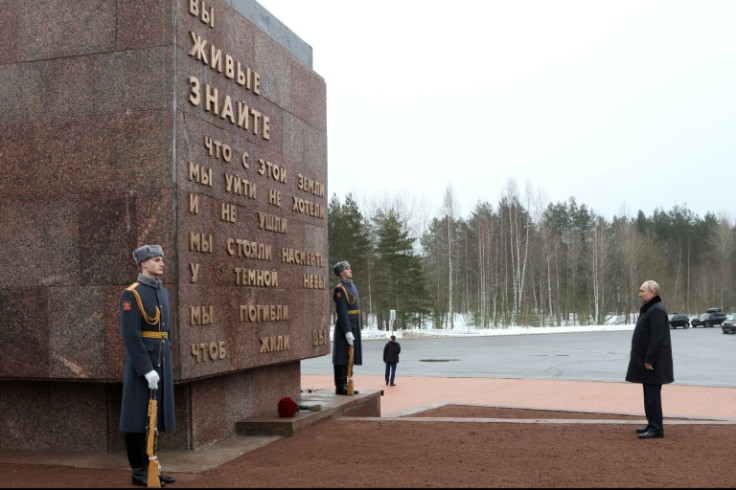Putin Repeats Ukraine Nazi Claims At Leningrad Siege Memorial

President Vladimir Putin on Saturday said Ukraine "glorifies" Adolf Hitler's SS killing squads and vowed to "eradicate Nazism," as he opened a memorial marking 80 years since the end of the siege of Leningrad.
The Russian leader has repeatedly invoked the Soviet Union's victory over Nazi Germany in the Second World War to justify his current offensive against Ukraine.
His charge that Ukraine is a fascist state that needs "de-Nazifying" has been debunked as false by independent experts.
On Saturday, Putin said "the regime in Kyiv glorifies Hitler's accomplices, the SS."
And Russia would "do everything possible to suppress and finally eradicate Nazism," he said.
"The followers of Nazi executioners, whatever they call themselves today, are doomed," he said near Saint Petersburg, his home town and the modern-day name of Leningrad.
Ukraine, the West and independent scholars have repeatedly rejected Putin's attempt to cast Kyiv as Nazi sympathisers.
He was speaking at the opening of a new memorial complex to victims of the siege of Leningrad -- an event which forms a major part of Putin's personal identity and one which has totemic importance for millions of Russians.
More than 800,000 people died from starvation, disease and bombardment during the 872-day encirclement by German forces in the Second World War.
Putin had earlier on Saturday visited a cemetery where more than 400,000 victims were buried in mass graves.
The Soviet Red Army broke the siege on 27 January 1944.
Although he was born after the war, Putin's elder brother died of starvation during the siege.
He has also recalled how his mother once fainted and was laid out in the street next to a bunch of corpses, presumed dead from hunger.
The Kremlin has been accused of manipulating its Second World War history to justify the offensive against Ukraine and a repressive turn at home.
The Soviet Union lost around 27 million people in what it calls the "Great Patriotic War" -- more than any other country.
Putin has made memory of the war central to Russia's national psyche.
Parades, monuments, cultural events and school curriculums have been increasingly dedicated to the heroism and courage of Soviet soldiers.
At the same time the Kremlin has sought to quash controversy surrounding the conflict.
Topics such as the Soviet Union's 1939 secret alliance with Germany to carve up Poland and the massacre of more than 20,000 Poles at Katyn by Joseph Stalin's secret police are taboo.
© Copyright AFP 2024. All rights reserved.







